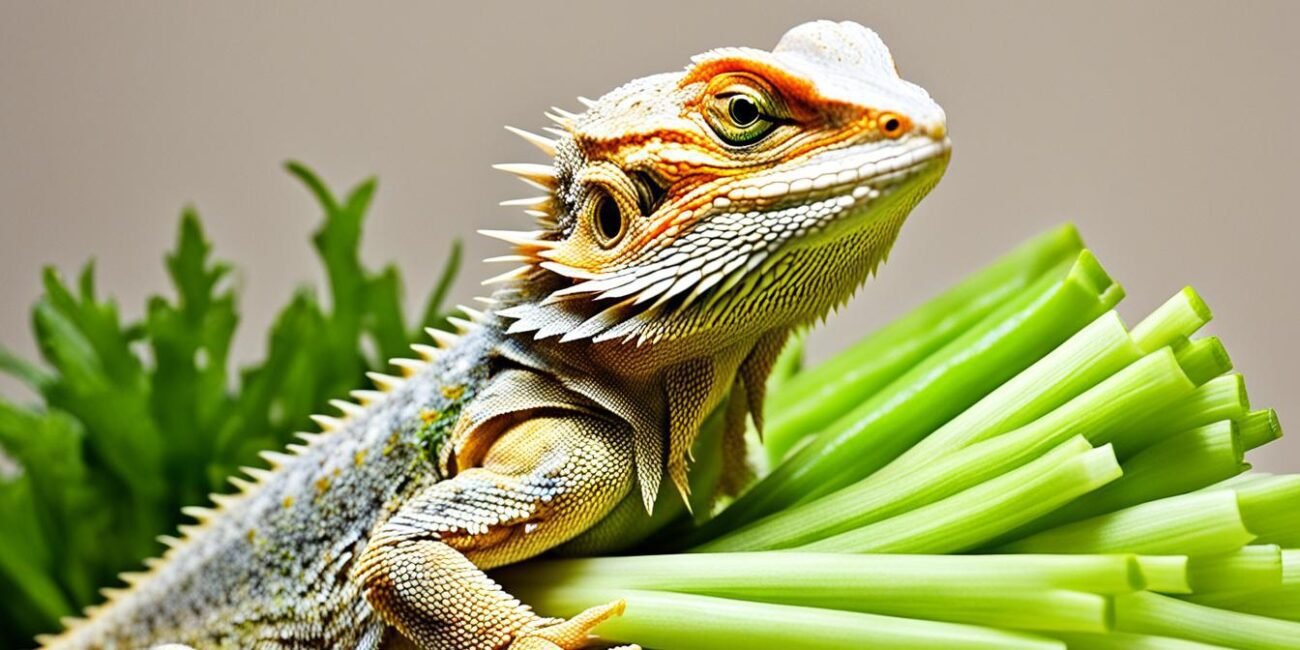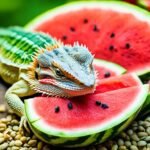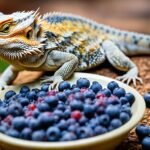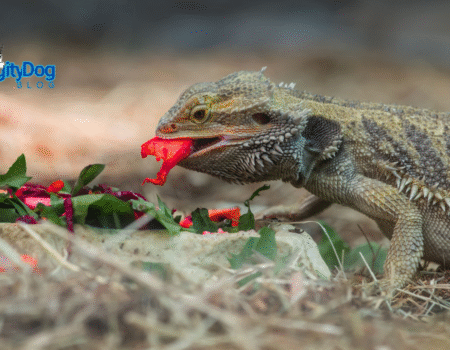Can Bearded Dragons Eat Celery? Unveiling the Truth
“Let food be thy medicine and medicine be thy food.” – Hippocrates
Greetings, fellow reptile enthusiasts! Today, I’d like to shed some light on a common query: can bearded dragons eat celery? As responsible pet owners, it’s crucial to ensure the nutritional needs of our scaly friends are met, while also keeping them safe and healthy. While the topic of feeding bearded dragons may seem simple, it’s essential to understand the pros and cons of adding new foods to their diet.
Key Takeaways:
- Celery is safe for bearded dragons in moderation due to its ideal calcium to phosphorus ratio.
- The high water content in celery helps keep bearded dragons hydrated.
- Celery leaves are safe for consumption and provide additional nutrients like calcium and vitamin E.
- Organic celery is recommended to avoid pesticide exposure.
- Be cautious of the oxalate content in celery, as excessive consumption can lead to kidney stones and metabolic bone disease.
Nutritional Value of Celery for Bearded Dragons
Celery offers several beneficial nutrients and minerals that contribute to the overall health and well-being of bearded dragons. While it may not provide a high amount of nutritional value, it can still be a part of a balanced bearded dragon diet when fed in moderation.
In a 100-gram serving of raw celery, the following elements can be found:
| Nutrient | Amount per 100g |
|---|---|
| Iron | 0.2mg |
| Fiber | 1.6g |
| Sugars | 1.3g |
| Protein | 0.7g |
| Calcium | 40mg |
| Vitamin A | 80µg |
| Vitamin E | 0.36mg |
| Vitamin K | 29.3µg |
| Potassium | 260mg |
| Vitamin B-6 | 0.07mg |
| Magnesium | 11mg |
| Phosphorus | 24mg |
| Beta-carotene | 449µg |
These nutrients play a vital role in supporting the growth, development, and overall health of bearded dragons.
It’s essential to note that while celery can provide some nutritional benefits, it should not be relied upon as the primary source of nutrition for bearded dragons. Instead, it should be part of a varied diet that includes other safe vegetables and appropriate protein sources.
Calcium to Phosphorus Ratio in Celery
When it comes to the nutritional value of celery for bearded dragons, one important aspect to consider is the calcium to phosphorus ratio. This ratio plays a crucial role in the growth and development of these reptiles and is vital for maintaining their overall health.
Bearded dragons require a calcium to phosphorus ratio of 2:1 to meet their dietary needs. Celery, surprisingly, provides a nearly perfect ratio to support their wellbeing. The leaves of celery contain approximately 40 milligrams of calcium and about 24 milligrams of phosphorus, offering a well-balanced combination.
This beneficial ratio is particularly essential as phosphorus has the tendency to bind with calcium, preventing its absorption into the bloodstream. By consuming celery in moderation, bearded dragons can obtain the necessary calcium to meet their growth requirements and help prevent the development of metabolic bone disease (MBD).
To better understand the calcium to phosphorus ratio in celery, take a look at the following comparison:
| Component | Calcium | Phosphorus | Ratio |
|---|---|---|---|
| Celery Leaves | 40mg | 24mg | 1.67:1 |
Above, you can see that celery leaves offer an ideal ratio close to the 2:1 requirement for bearded dragons. By incorporating celery with other calcium-rich foods, you can ensure that your bearded dragon’s nutritional needs are adequately met.
Next, we will explore the potential risks associated with consuming celery excessively and why moderation is key to maintaining your bearded dragon’s health.
Oxalates in Celery and their Effects on Bearded Dragons
While celery is safe for bearded dragons to consume in moderation, it is important to be aware of the presence of oxalates in this vegetable. Oxalates are compounds that can bind with calcium, potentially leading to the formation of kidney stones and metabolic bone disease (MBD) in bearded dragons.
As responsible bearded dragon owners, it is crucial to carefully monitor the amount of celery and other vegetables that are high in oxalates or phosphorus that we feed to our pets. Feeding these foods in excess can pose a risk to their health.
However, it’s important to note that oxalates are not inherently harmful. They can be safely incorporated into a bearded dragon’s diet as long as they are consumed in moderation and balanced with other safe vegetables.
By providing a variety of vegetables with lower levels of oxalates, we can ensure that our bearded dragons receive a well-rounded and nutritious diet.
The Importance of a Balanced Diet
Bearded dragons thrive on a diverse diet that includes a variety of safe vegetables. Feeding a balanced mixture of vegetables ensures that bearded dragons receive a range of nutrients necessary for their overall health and well-being.
“A balanced diet is key to maintaining the optimal health of your bearded dragon. Incorporating a variety of safe vegetables, including celery, can help meet their nutritional needs while minimizing the risks associated with oxalates.” – Dr. Emily Thompson, Reptile Nutrition Specialist
Safe Vegetables for Bearded Dragons
While celery does contain oxalates, there are plenty of other safe vegetables that can be included in a bearded dragon’s diet. These include:
- Kale
- Collard greens
- Mustard greens
- Turnip greens
- Dandelion greens
- Butternut squash
These vegetables offer a range of nutrients, vitamins, and minerals that are important for bearded dragons. By rotating these vegetables into their diet, we can mitigate the potential risks associated with oxalates while ensuring their nutritional needs are met.
The Role of Calcium and Phosphorus
Calcium and phosphorus are essential for the growth and development of bearded dragons. Maintaining a proper balance between these two minerals is important to prevent metabolic bone disease (MBD).
When it comes to celery, it is important to note that the calcium to phosphorus ratio is within the ideal range for bearded dragons. This means that while celery contains oxalates, it also contributes to their calcium requirements, which can help prevent the development of MBD.
Feeding Celery Responsibly
Feeding celery to bearded dragons requires responsible and careful monitoring. Here are some guidelines to follow:
- Feed celery in moderation, as an occasional treat, not as a staple part of their diet.
- Ensure celery is thoroughly washed to remove any chemical residues. Choosing organic celery is recommended to avoid pesticide exposure.
- Cut celery into small, manageable pieces to prevent choking hazards.
- Offer a variety of safe vegetables to balance the diet and minimize the risks associated with oxalates.
By following these guidelines, we can provide our bearded dragons with the nutritional benefits of celery while minimizing their exposure to oxalates and maintaining their overall health.
Feeding Celery to Bearded Dragons
When it comes to feeding bearded dragons, celery is a nutritious option that can be offered in their diet. Whether you have an adult bearded dragon or a baby one, celery can be a safe and healthy choice. Here’s what you need to know about feeding celery to bearded dragons.
Can Bearded Dragons Have Celery?
Yes, bearded dragons can have celery. It is safe for them to consume, but like any food, it should be given in moderation. Celery can provide some nutritional benefits and variety to their diet.
Can Baby Bearded Dragons Eat Celery?
Yes, baby bearded dragons can eat celery. However, it is important to note that baby dragons have different dietary requirements than adults. They should be offered smaller amounts of celery and less frequently, generally once a month.
Can Bearded Dragons Eat Celery Leaves?
Absolutely! Celery leaves are safe for bearded dragons and can be offered along with the chopped celery stalks. These leaves provide additional nutrients like calcium, fiber, and vitamin E, making them a healthy addition to their diet.
Can Bearded Dragons Eat Celery Sticks?
Yes, bearded dragons can eat celery sticks. However, to prevent choking hazards, it is important to chop the celery sticks into small pieces before serving them to your dragon. This will make it easier for them to consume and digest.
Can Bearded Dragons Eat Celery Raw?
Absolutely! Bearded dragons can eat celery raw without the need for cooking. This ensures that they receive all the beneficial nutrients present in raw celery.
Remember, moderation is key when feeding celery to bearded dragons. It should be offered as part of a balanced and varied diet that includes other safe vegetables. By following these guidelines, you can safely incorporate celery into your bearded dragon’s diet and provide them with the nutrition they need to thrive.
| Can Bearded Dragons Have Celery | Can Baby Bearded Dragons Eat Celery | Can Bearded Dragons Eat Celery Leaves | Can Bearded Dragons Eat Celery Sticks | Can Bearded Dragons Eat Celery Raw |
|---|---|---|---|---|
| Yes | Yes, in smaller amounts and less frequently | Yes | Yes, but chopped into small pieces | Yes |
Mixing Celery with Other Vegetables for Bearded Dragons
Celery can be mixed with other vegetables to create a balanced and nutritious meal for bearded dragons. Incorporating a variety of safe vegetables into their diet ensures that bearded dragons receive a range of essential vitamins, minerals, and fiber to support their overall health.
When selecting vegetables to mix with celery, consider options such as:
- Carrots
- Bell peppers
- Butternut squash
- Kale
These vegetables provide additional nutrients that contribute to the well-being of bearded dragons. Carrots are rich in vitamin A, bell peppers contain vitamin C, butternut squash offers vitamin E, and kale is a great source of calcium.
To ensure easy consumption and digestion, it is important to chop the vegetables into small, manageable pieces. This makes it easier for bearded dragons to eat and promotes efficient nutrient absorption. Remember to monitor your bearded dragon’s acceptance and reaction to different vegetables, as individual preferences can vary.
Incorporating a varied diet of safe vegetables, including celery, helps meet the nutritional needs of bearded dragons and keeps their diet interesting and enjoyable.
Pros of Feeding Celery to Bearded Dragons
While celery may not offer a high amount of nutritional value, it does provide some benefits for bearded dragons. Let’s explore the advantages of including celery in their diet:
1. Calcium to Phosphorus Ratio
Celery has a calcium to phosphorus ratio that aligns with the dietary requirements of bearded dragons, promoting healthy growth and development. This optimal ratio supports their skeletal system and helps prevent metabolic bone disease (MBD).
2. Hydration
One of the benefits of celery is its high water content, which can help hydrate bearded dragons, especially when they are sick or dehydrated. Proper hydration is essential for their overall health and well-being.
3. Fiber Content
Celery has a good fiber content, which aids in their digestion and promotes a healthy gut. Adequate fiber intake can prevent constipation and promote regular bowel movements.
4. Low Sugar Content
Compared to some other fruits and vegetables, celery has a low sugar content. This makes it a healthy addition to a balanced diet for bearded dragons, reducing the risk of excessive sugar intake and associated health issues.
Incorporating celery into a bearded dragon’s diet can provide these benefits, but it should be fed in moderation alongside other nutritious vegetables to ensure a well-rounded diet.
I love offering celery to my bearded dragon as a refreshing treat. Its hydrating properties and fiber content make it a great addition to their meals. Plus, the calcium to phosphorus ratio supports their bone health. Just remember to feed it in moderation and alongside other safe vegetables to maintain a balanced diet. – [Your Name]
Cons of Feeding Celery to Bearded Dragons
While celery is a suitable addition to a bearded dragon’s diet, it does come with some considerations. Although it provides hydration and a low-calorie option, celery has a lower nutritional value compared to other vegetables. This means that it should not be the primary source of nutrition for bearded dragons. While the high water content in celery is beneficial for hydration, it can dilute the intake of essential nutrients and minerals.
Another factor to consider is the presence of oxalates in celery. Consuming excessive amounts of oxalates can lead to health issues such as kidney stones and metabolic bone disease (MBD) in bearded dragons. Therefore, it is crucial to balance the amount of celery and other vegetables in a bearded dragon’s diet to maintain their overall health and well-being.
Additionally, while bearded dragons can eat vegetables, it is important to offer a varied diet that includes a mix of safe vegetables to ensure they receive a wide range of nutrients. Relying solely on celery or any single vegetable may result in nutritional deficiencies. Greens such as collard greens, mustard greens, and dandelion greens are excellent options to include in a bearded dragon’s diet.
“Variety is key when it comes to feeding bearded dragons vegetables.
By offering a diverse selection of safe vegetables, including celery in moderation, we can ensure that our little reptile friends receive the well-rounded nutrition they need.”
Nutritional Comparison of Celery and Other Vegetables
| Vegetable | Calcium (mg) | Phosphorus (mg) | Vitamin A (µg) | Vitamin C (mg) |
|---|---|---|---|---|
| Celery (raw, 100g) | 40 | 24 | 22 | 3 |
| Collard Greens (cooked, 100g) | 145 | 47 | 1937 | 35 |
| Mustard Greens (raw, 100g) | 165 | 52 | 1138 | 70 |
| Dandelion Greens (raw, 100g) | 187 | 66 | 5080 | 35 |
As seen in the table above, while celery does provide some essential nutrients, other vegetables such as collard greens, mustard greens, and dandelion greens offer significantly higher amounts of vitamins and minerals. Including a variety of vegetables in a bearded dragon’s diet ensures they receive a balanced intake of essential nutrients to support their overall health and well-being.
Ultimately, incorporating celery into a bearded dragon’s diet can be done in moderation, alongside a diverse selection of safe vegetables. By providing a well-rounded and balanced nutritional plan, we can ensure that our bearded dragon companions thrive and enjoy a healthy life.
Do Bearded Dragons Like Celery?
Bearded dragons, like humans, have different preferences when it comes to food. While some bearded dragons may enjoy eating celery, others may not show much interest in it. Just like us, they have their own unique taste buds!
If you’re introducing celery to your bearded dragon’s diet, it’s important to observe their reaction and adjust accordingly. Some bearded dragons may eagerly gobble up celery, while others may show little interest. It’s all about understanding and catering to their individual preferences.
However, offering a variety of vegetables, including celery, is essential to ensure that your bearded dragon has a balanced and enjoyable diet. Don’t get discouraged if they don’t immediately take a liking to celery. There are plenty of other safe vegetables that can be offered to meet their nutritional needs.
Remember, bearded dragons are unique creatures with their own personalities. Just like us, they have their own preferences and tastes. So, if your bearded dragon doesn’t like celery, don’t worry! There are plenty of other healthy options for them to enjoy.
If you’re unsure about what vegetables to offer your bearded dragon, consult with a reptile veterinarian or qualified herpetologist. They can provide guidance on the best diet for your bearded dragon, taking into consideration their specific needs and preferences.
Offering a diverse range of vegetables ensures that your bearded dragon receives a balanced and nutritious diet.
Remember, happy and healthy bearded dragons are those that receive a well-rounded diet catered to their unique preferences and nutritional requirements.
Feeding Celery to Bearded Dragons: Preparation Tips
When considering incorporating celery into a bearded dragon’s diet, it is essential to follow some preparation tips to ensure their well-being. By taking the necessary precautions, you can safely offer celery to your bearded dragon. Here are some important steps to follow:
- Thoroughly wash the celery stalks and leaves: Before feeding celery to your bearded dragon, wash the stalks and leaves thoroughly to remove any chemical residues. This step helps ensure that your pet is not exposed to harmful substances that may be present on the surface of the celery.
- Choose organic celery: To further minimize the risk of pesticide exposure, it is recommended to choose organic celery. Organic produce is grown without the use of synthetic pesticides, making it a safer option for your bearded dragon.
- Check for rust, rotten pieces, or blemishes: Inspect the celery for any signs of rust, rotten pieces, or blemishes. If you come across any, promptly remove them with a small, sharp knife to ensure that you are offering only fresh and healthy celery to your bearded dragon.
- Cut the celery into small pieces: Bearded dragons have small mouths, so it is important to cut the celery into small, manageable pieces of around 1/4 inch. This size allows them to eat the celery with ease, reducing the risk of choking or discomfort.
- Avoid cooking celery: Cooking celery is not necessary when feeding it to your bearded dragon. While cooking may soften the celery, it can also destroy some of the valuable nutrients present in the raw form. Therefore, it is best to offer celery in its natural state, as this ensures your pet receives optimal nutritional benefits.
- Mix celery with other fruits and vegetables: To provide a varied and balanced diet, add the chopped celery to your bearded dragon’s food bowl along with other fruits and vegetables. This mixture offers a range of nutrients and flavors, making mealtime more interesting and enjoyable for your pet.
- Thoroughly mix the food and powders: Before feeding the prepared food to your bearded dragon, ensure that you thoroughly mix it with any supplements such as calcium powder and multivitamin powders. This step guarantees that the nutrients are evenly distributed throughout the meal, promoting your dragon’s overall health and well-being.
By following these preparation tips, you can confidently introduce celery into your bearded dragon’s diet. Remember to monitor your pet’s reaction and adjust their diet accordingly to ensure a safe and balanced nutritional intake.
Note: Always consult with a reptile veterinarian or an expert in bearded dragon care for personalized advice regarding their diet and specific feeding requirements.
Conclusion: Incorporating Celery into a Bearded Dragon’s Diet
After considering the nutritional value and potential benefits and drawbacks of feeding celery to bearded dragons, it is evident that it can be safely incorporated into their diet as an occasional snack. Celery provides some nutritional value, including a beneficial calcium to phosphorus ratio, hydration, fiber, and low sugar content. However, it is important to note that celery should not be the main source of nutrition for bearded dragons.
Due to its oxalate content, overfeeding celery can lead to health issues such as kidney stones and metabolic bone disease (MBD). Therefore, it is crucial to balance the amount of celery and other safe vegetables in a bearded dragon’s diet to ensure their optimal health and well-being. Monitoring their reaction to celery and adjusting their diet accordingly is key to maintaining a balanced and nutritious diet for bearded dragons.
While incorporating celery into a bearded dragon’s diet can offer some benefits, it is essential to provide a varied diet that includes other safe vegetables to meet their nutritional needs. By following proper preparation tips, such as choosing organic celery and cutting it into small, manageable pieces, bearded dragons can safely enjoy the occasional incorporation of celery in their diet as part of a well-rounded meal plan.
FAQ
Is celery safe for bearded dragons to eat?
Yes, celery is safe for bearded dragons to consume every other week or so.
What is the nutritional value of celery for bearded dragons?
Celery provides iron, fiber, sugars, protein, calcium, vitamin A, vitamin E, vitamin K, potassium, vitamin B-6, magnesium, phosphorus, and beta-carotene.
Does celery have the right calcium to phosphorus ratio for bearded dragons?
Yes, the calcium to phosphorus ratio in celery aligns with the dietary needs of bearded dragons.
Are there any potential health issues with feeding celery to bearded dragons?
Celery contains oxalates, which can bind with calcium and potentially cause kidney stones and metabolic bone disease if consumed in excess.
How should I feed celery to my bearded dragon?
Celery should be washed, chopped into small pieces, and served raw. Baby bearded dragons can consume smaller amounts of celery, generally once a month.
Can I mix celery with other vegetables for my bearded dragon?
Yes, celery can be mixed with other safe vegetables like carrots, bell peppers, butternut squash, and kale to create a balanced meal for bearded dragons.
What are the benefits of feeding celery to bearded dragons?
Celery provides hydration, fiber, and a low sugar content, making it a healthy addition to a balanced diet for bearded dragons.
Are there any drawbacks to feeding celery to bearded dragons?
Celery has a low amount of nutrients compared to other vegetables and can dilute the intake of other important minerals. It also contains oxalates that can cause health issues if consumed in excess.
Do all bearded dragons like eating celery?
Bearded dragons have different preferences, so some may enjoy celery while others may not. It’s best to observe your bearded dragon’s reaction to celery and adjust their diet accordingly.
What are some tips for preparing celery for bearded dragons?
Thoroughly wash the celery, choose organic to avoid pesticides, remove any damaged parts, and chop it into small pieces to avoid choking hazards.
Can celery be a part of a bearded dragon’s balanced diet?
Yes, celery can be safely incorporated into a bearded dragon’s diet as an occasional snack when balanced with other safe vegetables.










No Comment! Be the first one.